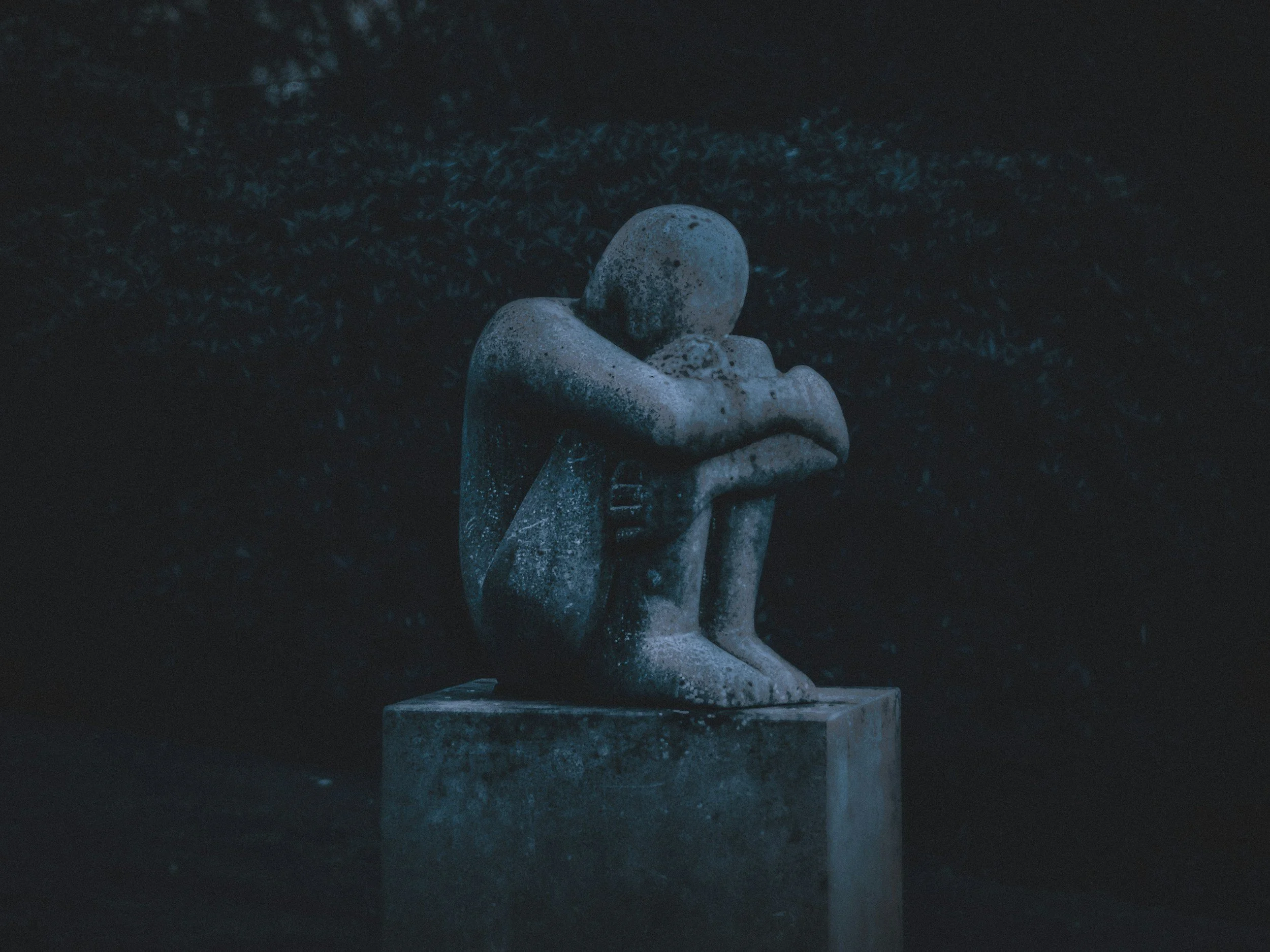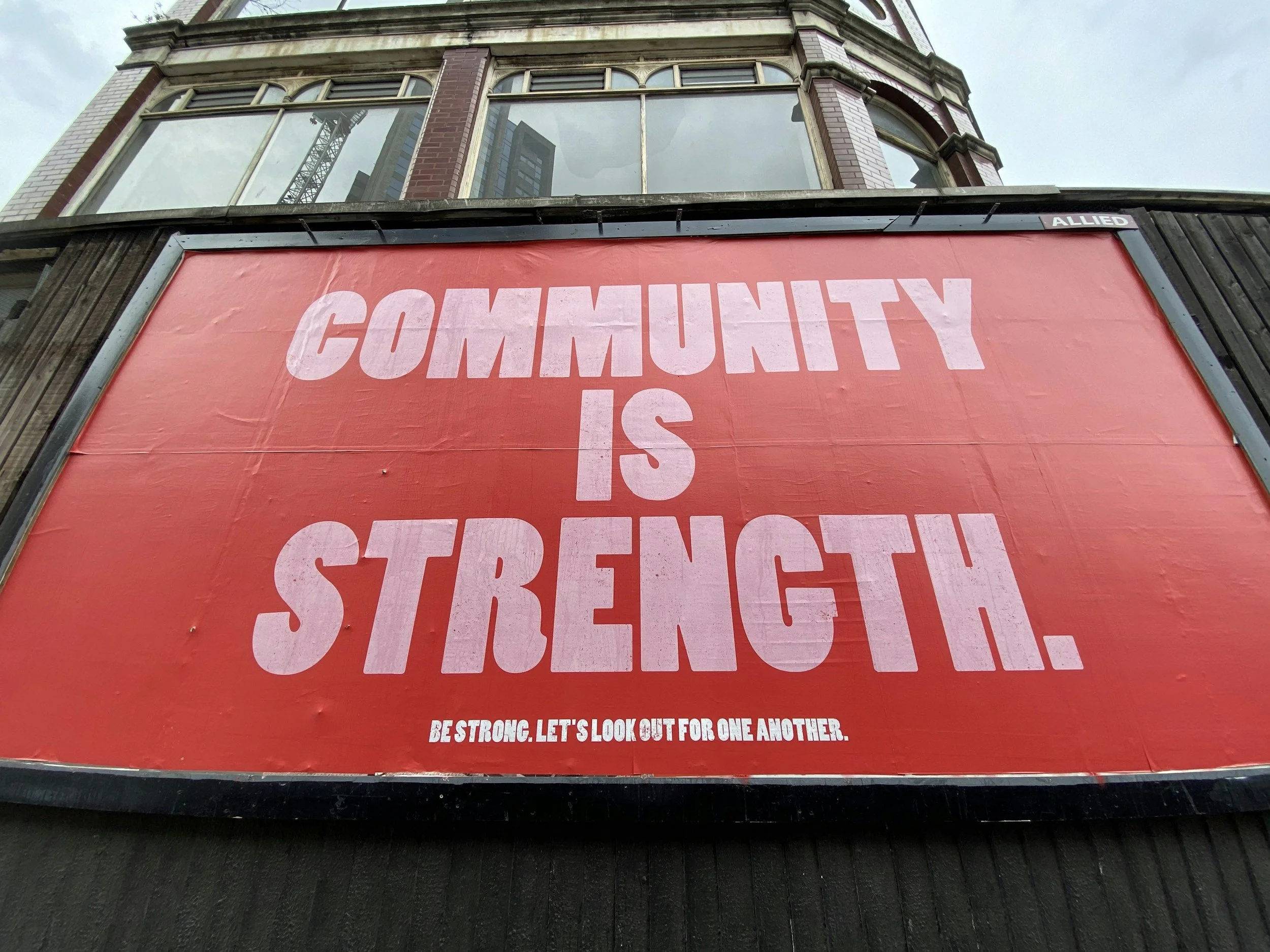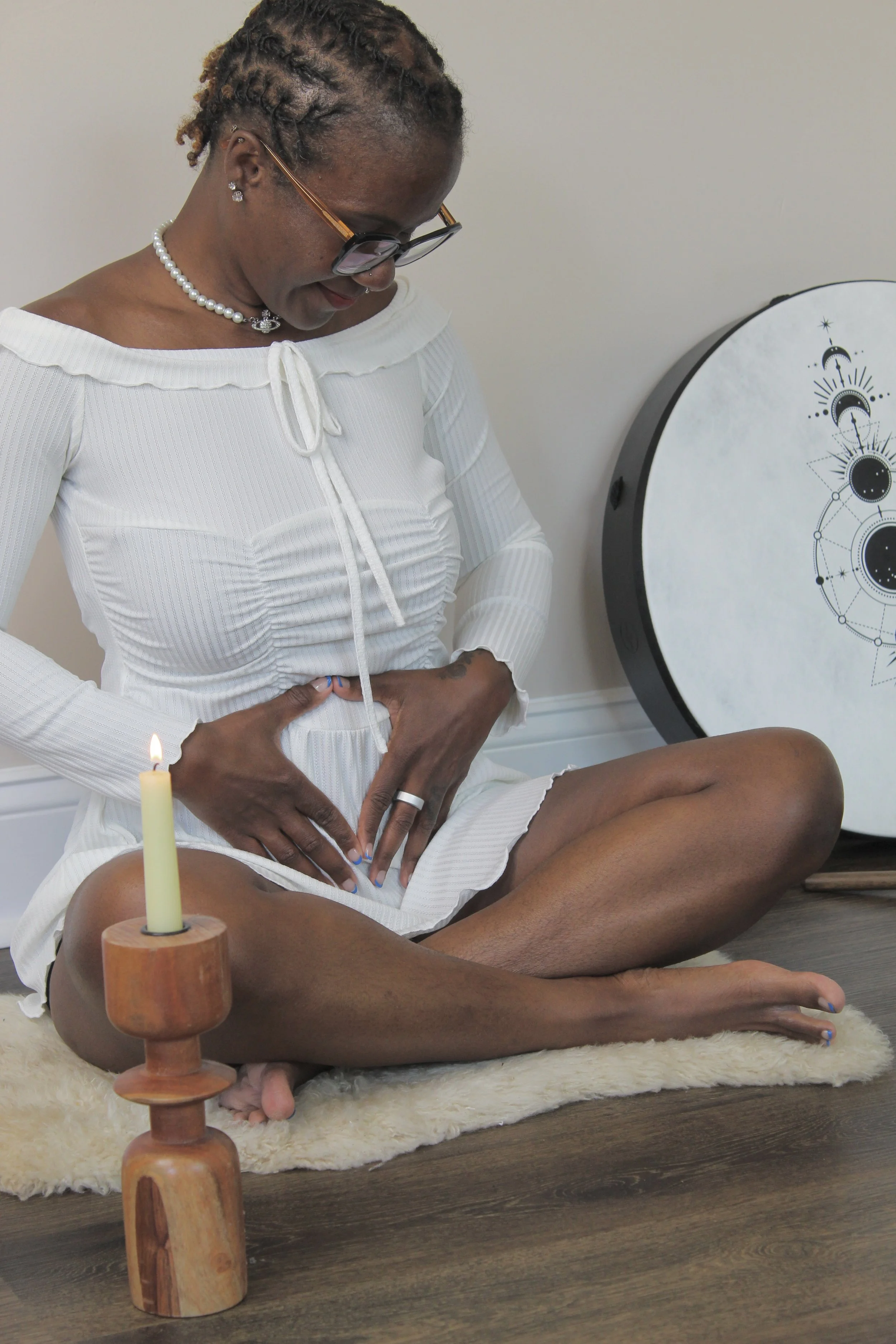8 Gentle Strategies for Facing Your Shadows This Fall
When the Leaves Fall, So Do Our Masks
There's something about autumn that invites us inward. As nature releases what it no longer needs—leaves falling, light dimming, growth slowing—we too are called to examine what we've been holding onto that's ready to be released.
This is shadow work season, beautiful soul. Not the harsh, dramatic confrontation you might imagine, but a gentle turning toward the parts of yourself and your story that have been waiting in the wings for your loving attention.
And often, what we find in those shadows is grief.
The Grief We Don't Talk About
When we think of grief, we usually think of death - the loss of a person we love. But grief is so much more expansive than that. Grief is the natural response to any loss, any ending, any letting go.
The grief of a body that doesn't work the way it used to - whether from chronic illness, aging, injury, or the slow accumulation of stress that finally demands attention.
The grief of relationships that have changed or ended - divorces, friendships that faded, family members who couldn't meet you where you are, connections that once felt like home but no longer fit.
The grief of the mother-daughter relationship you longed for but never had - or the one you had but lost to distance, misunderstanding, or death.
The grief of dreams deferred or released - the career you didn't pursue, the children you didn't have (or did have but grieve the life you had before them), the person you thought you'd become by now.
The grief of your own innocence lost - the you who existed before trauma, before heartbreak, before the world taught you to protect yourself by hiding.
All of this is real. All of this deserves to be witnessed. All of this is shadow work.
Why Fall is the Perfect Season for This Sacred Work
Nature doesn't apologize for autumn. The trees don't feel guilty about letting their leaves fall. They don't try to hold on to summer or rush into winter. They simply honor the season they're in.
Autumn teaches us that release is natural, that letting go is part of the growth process, and that death always precedes rebirth.
As the days grow shorter and the air turns crisp, we're invited to:
Slow down our pace and turn inward
Examine what we've been carrying that's ready to be released
Grieve what needs to be grieved
Make space for what wants to emerge in the spring
This isn't morbid or depressing - it's deeply healing. Shadow work during fall feels like working with nature instead of against it.
What Shadow Work Really Means (The Soft Hearts Way)
If you've heard of shadow work before, you might imagine dramatic confrontations with your demons, forced excavation of trauma, or harsh judgment of your "dark side."
That's not how we do it at The Soft Hearts Society™.
For us, shadow work is simply the gentle practice of turning toward the parts of yourself and your story that you've learned to hide, deny, or suppress—not to judge them, but to understand them with compassion.
Your shadow includes:
Emotions you've been taught aren't acceptable (anger, jealousy, sadness, neediness)
Parts of yourself you've deemed "too much" or "not enough"
Grief, you haven't allowed yourself to fully feel
Patterns you're repeating without awareness
Truths about your life or relationships you've been avoiding
The shadow isn't bad or wrong - it's just the parts of your wholeness that have been exiled and are waiting to come home.
The Many Faces of Grief: What You Might Be Carrying
Physical Grief: When Your Body Becomes Unfamiliar
Allonia shares: When my burnout left me bedridden for months, I grieved the body I'd taken for granted - the one that could push through exhaustion, that rarely got sick, that seemed invincible. Lying in bed, unable to function, I had to grieve the loss of that version of myself and learn to love the body that was teaching me about limits.
What physical grief looks like:
Grieving physical abilities lost to illness, injury, or aging
Mourning the energy you once had before chronic fatigue or burnout
Processing the loss of fertility, whether through choice or circumstance
Coming to terms with a diagnosis that changes everything
Accepting a body that looks or feels different after trauma, surgery, or life changes
The Shadow Work Invitation: Your body isn't betraying you—it's communicating with you. What is it trying to tell you that you've been avoiding hearing?
Relational Grief: When Love Changes or Ends
What relational grief looks like:
Divorce or the ending of a long-term partnership
Friendships that faded when you started choosing differently
Family members who can't accept your growth or boundaries
The death of someone you love
Relationships that exist but feel hollow or performative
Loving someone who can't love you the way you need
The Shadow Work Invitation: What are you grieving about in this relationship? Not just the loss of the person, but the loss of the future you imagined, the version of yourself you were in that relationship, the belonging you felt (or longed for).
Mother-Daughter Grief: The Most Complex Loss
Rose reflects: Even though my mom is alive and we work together now, I still had to grieve the version of her who was too burned out to be fully present during my early teen years. And she had to grieve the daughter who needed things she couldn't give at that time. This grief actually brought us closer because we finally acknowledged what we'd lost instead of pretending it didn't matter.
What mother-daughter grief looks like:
Grieving the mother you needed but didn't have
Mourning the childhood you deserved but didn't experience
Processing the loss of your mother to death, distance, or dementia
Accepting that your mother may never see or understand you
Releasing the fantasy of "one day" things will be different
For mothers: Grieving the mother you wish you'd been able to be
The Shadow Work Invitation: You can grieve what you didn't have and still love your mother. You can wish things had been different AND accept what was. Both truths can coexist.
Dream Grief: Mourning the Life You're Not Living
What dream grief looks like:
The career path you didn't take
The creative pursuits you postponed indefinitely
The adventures you've been too afraid or busy to pursue
The children you didn't have (by choice or circumstance)
The version of yourself you thought you'd become by now
The relationship with your body, your health, and your energy, you imagined having
The shadow work invitation: What dreams are you still carrying that need to be either pursued or released? Holding onto dreams you're not actualizing creates a specific kind of suffering.
Innocence Grief: Losing the You Before
What innocence grief looks like:
Mourning the version of yourself before trauma
Grieving the openness you had before betrayal
Missing the trust you had before someone broke it
Longing for the confidence you had before criticism dimmed you
Wishing you could still believe what you believed before you knew better
The shadow work invitation: You can't go back to innocence, but you can integrate wisdom. Who are you becoming in the wake of this loss? What gifts have emerged from this grief?
Gentle Strategies for Facing Your Shadows This Fall
Strategy 1: The Autumn Grief Inventory
Create space for honest acknowledgment of what you're carrying.
Find a quiet evening as the sun sets earlier. Light a candle. Pour yourself tea. Open your journal.
Write: "What am I grieving that I haven't fully acknowledged?"
Then let your pen move without censoring. You might be surprised by what emerges when you finally permit it.
Follow-up prompts:
What physical losses am I carrying?
What relationship endings still ache?
What version of my mother-daughter relationship do I mourn?
What dreams am I holding onto that need to be released?
What innocence have I lost that I'm still mourning?
Remember: This isn't about wallowing - it's about witnessing. You can't heal what you won't acknowledge.
Strategy 2: The Sacred Release Ritual
Honor what you're letting go with ceremony.
On a fall evening, preferably during the waning moon, create a simple release ritual:
You'll need:
Paper and pen
A fireproof bowl or outdoor fire pit
Matches or lighter
A meaningful object (stone, crystal, or natural item)
The practice:
Write what you're releasing on separate pieces of paper - one loss or grief per page
Read each one aloud, acknowledging it fully
Say: "I honor this grief. I release it with love. I make space for what wants to emerge."
Burn the paper safely, watching the smoke carry your grief upward
Hold your meaningful object and speak your intention for what you're calling in
Alternative for those who can't burn: Bury the papers in the earth or dissolve them in water, returning them to nature.
Strategy 3: The Body Grief Practice
Let your body express what words cannot.
Grief lives in our bodies - in tight shoulders, clenched jaws, held breath, sunken chests. Movement can release what talking cannot.
Practices to try:
Intuitive movement: Put on music and let your body move however it needs to - shaking, swaying, curling up small, reaching big
Breath work: Lie down and breathe deeply into your belly, allowing any sounds or tears to emerge
Walking meditation: Stroll in nature, noticing what your body wants to release with each exhale
Gentle yoga: Hip openers and heart openers specifically support grief release
Allonia shares: During my months of bed rest, I couldn't move much, but I could breathe. I spent hours just breathing and crying, letting my body express the grief it had been holding for years. Sometimes the most healing thing we can do is allow our body to do what it needs to do.
Strategy 4: The Mother-Daughter Shadow Dialogue
For those healing mother wounds, this practice creates space for understanding.
You'll write two letters you'll never send:
Letter 1: To Your Mother (or Mother Figure) Write everything you need to say - the anger, the hurt, the longing, the gratitude, the confusion. Don't censor. This is for you, not her.
Letter 2: From Your Mother to You This is harder but profound: Write what you imagine she might say if she could access her highest, healed self. What would she acknowledge? What would she apologize for? What would she want you to know about why she couldn't give you what you needed?
After writing:
Notice what shifts in your understanding
Practice compassion for both of you
Decide what you need to heal, regardless of whether she ever changes
Strategy 5: The Grief Witness Circle
Share your grief with safe others who can hold space for you.
One of the most healing aspects of The Soft Hearts Society is that we create space for grief to be witnessed without being fixed, explained away, or rushed.
If you're part of a healing community:
Share your grief in a circle where others listen
Ask for what you need: "I just need you to witness this, not fix it."
Offer the same sacred witnessing to others
If you're not in community yet:
Find a trusted friend who can hold space without trying to make it better
Consider joining The Soft Hearts Society™, where grief is welcomed as part of healing
Work with a therapist who understands grief as a process, not a problem
The practice: One person shares their grief for 5-10 minutes while others witness with compassionate presence—no advice, no fixing, no "at least" statements. "I see you. I hear you. Your grief is valid."
Strategy 6: The Autumn Altar Practice
Create a physical space that honors your grief and shadow work.
Set up a small altar with:
Photos of who or what you're grieving
Natural items from fall (leaves, acorns, pinecones)
A candle you light when doing grief work
A journal for your shadow work reflections
Meaningful objects that represent your journey
Use your altar as:
A place to sit and acknowledge your grief daily
A visual reminder that shadow work is sacred work
A container for your healing process
A space that shifts as you shift through the season
Each day, light your candle and say: "I honor my grief. I welcome my shadows. I trust the wisdom of fall's release."
Strategy 7: The Permission Practice
Give yourself explicit permission for what grief requires.
Grief asks us to do things that might feel uncomfortable, selfish, or "too much." This practice helps you give yourself what you need.
Write and post where you'll see it:
I give myself permission to:
Cry when I need to, even if it's inconvenient
Say no to social obligations that feel too heavy
Take up space with my grief
Need more rest than usual
Change my mind about what I can handle
Feel multiple emotions at once
Take as long as I need to heal
Ask for support
Honor my body's wisdom
Grieve things others might not understand
Add your own permissions. What does your grief need that you've been denying?
Strategy 8: The Integration Writing Practice
Process your shadow work through reflective journaling.
Set aside 20 minutes each week this fall for integration writing.
Weekly prompts:
Week 1: What shadow am I being invited to face this season?
Week 2: What grief have I been avoiding that's ready to be acknowledged?
Week 3: How is my body holding this grief? What does it need from me?
Week 4: What am I learning from this darkness?
Week 5: How is my relationship with my mother (or mother wound) asking to be healed?
Week 6: What dreams am I ready to release or resurrect?
Week 7: Who Am I Becoming Through This Grief Work?
Week 8: What wants to emerge from this shadow work?
Don't judge what comes up. Let your pen move freely. The goal is expression, not perfection.
What Happens After We Face Our Shadows
Here's what we've learned from doing this work ourselves and witnessing thousands of women in The Soft Hearts Society™ move through shadow work:
The grief doesn't disappear, but it stops controlling you. You learn to carry it with more grace, like a stone you've learned to hold differently.
You stop being triggered by everything. When you've faced your own shadows, other people's behaviors become less personal.
Your relationships improve. When you stop avoiding your own grief, you can hold space for others' grief without trying to fix it.
You become more authentic. There's less performance, more presence. Less pretending, more truth.
You make space for joy. This is the paradox: when you finally let yourself grieve fully, you also allow yourself to feel joy fully. Both expand together.
You model healing for others. When people see you face your shadows with courage and compassion, they get permission to face theirs.
Allonia reflects: My months of forced darkness and grief work became the foundation of the most authentic, joyful period of my life. Not in spite of the shadow work - because of it. When I finally stopped running from my grief, I stopped running from myself.
A Gentle Reminder as You Do This Work
Beautiful soul, shadow work isn't about fixing yourself or becoming perfect. It's about becoming whole by reclaiming the parts of yourself you've exiled.
You are not broken. You're simply human, carrying human grief, navigating human loss, learning to be with the full spectrum of human experience.
You don't have to do this alone. In fact, shadow work is often safer and more effective when done in community with others who understand that healing isn't linear, that grief comes in waves, that some days you're strong and some days you're not.
You don't have to do it all at once. Autumn lasts three months. Pick one strategy this week. Try another next week. Return to what helps. Release what doesn't.
You don't need permission to grieve. But if you need someone to say it, we permit you. Your grief is valid. Your shadows deserve loving attention—your healing matters.
This Fall, Let the Leaves Show You How
Watch how the trees release their leaves this autumn. Notice their lack of resistance, their trust in the process, their understanding that letting go creates space for new growth.
They don't apologize for their shedding.
They don't try to hold on to what's ready to fall.
They don't rush the process or judge themselves for it.
They simply honor the season they're in.
This fall, can you do the same?
Can you acknowledge what you're carrying that's ready to be released?
Can you grieve what needs to be grieved without shame?
Can you face your shadows with the same gentle compassion you'd offer a dear friend?
Can you trust that this release is making space for something beautiful to emerge?
Your shadow work is sacred, beautiful soul.
Your grief deserves to be witnessed.
Your wholeness is waiting in the shadows.
This autumn, let the leaves show you how to let go with grace.
You don't have to do this alone. Shadow work is often safer and more effective in community with others who understand that healing includes both light and dark.
Ready to join us? Learn more about The Soft Hearts Society™ membership here.
P.S. If this post brought up grief or shadows you're not ready to face alone, please reach out. We're here to support you, and we have resources available to help you find professional assistance if needed. Your healing matters, beautiful soul. 🤍
Share this post with a woman who might need permission to grieve this fall.
Pin it, bookmark it, return to it as the season invites you deeper into this sacred work.
And remember: autumn always leads to spring. The release makes space for rebirth. Your shadows are just parts of your wholeness waiting to come home. 🍂









